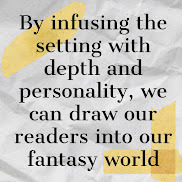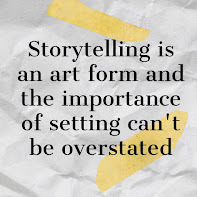The Power of Setting

When most readers pick up our novels, they’re anticipating an escape. They want to find a few moments away from their everyday lives to live in a world with their favorite (or soon to be) characters. While characters and plot are undoubtedly essential components, never overlook the vital role that setting plays. As authors. we must craft the setting of our stories to evoke emotions and enrich the plot. We need to create an experience for our readers that makes them look forward to our next book or continue reading our series, because we given them a book that’s the entire HEA experience.

Setting as a Character
Just as we carefully craft our characters with backstory, hopes, and dreams, the setting of a novel often assumes the role of a character, as well and should be treated with the same diligence. A well-developed setting possesses its own personality, history, and distinct characteristics that influence the story and its inhabitants. Let’s bring in the masters as examples: J.R.R. Tolkien's Middle-earth or Arthur Conan Doyle's fog-shrouded Victorian London. These settings aren’t just backdrops, but “story engines” that shape the events and drive the actions of the characters. By infusing the setting with depth and personality, we can draw our readers into our fantasy world, allowing them to feel as though they are truly part of the world within the pages.
Setting as a Source of Conflict
Setting can be a fertile source of conflict, intensifying the challenges faced by the characters. Whether it's a bleak and desolate post-apocalyptic wasteland, a medieval castle fraught with hidden dangers, or a small mountain town with it’s own everyday drama, the environment can present formidable obstacles that characters must overcome. Depending on the plot of your novel, the setting can also reflect societal, cultural, or political tensions, adding layers of complexity to the narrative. Imagine a tinder dry California town threatened by wildfire, or a 9.0 earthquake that shakes a major city that then needs to brace for the ensuing tsunami. By integrating conflict within the setting, we not only heighten the stakes but also invite a deeper connection between our reader and the story's events.

Setting as an Emotional Catalyst
The power of setting lies in its ability to evoke emotions and immerse readers in a particular atmosphere. From the cozy charm of a small-town café to the foreboding gloom of a haunted mansion, the ambiance created by the setting can elicit a wide range of emotions. Can we all say Agatha Christie, Stephen King, Ray Bradbury? A well-described setting can transport readers to another time, place, or state of mind, enabling them to experience joy, fear, nostalgia, or awe alongside the characters. By building on powerful sensory details of the setting, we can foster an emotional connection that our readers won’t soon forget.
Setting as a Reflection of Themes
A thoughtfully crafted setting can serve as a symbolic representation of the novel's themes and motifs. The physical environment can mirror the internal struggles or conflicts faced by the characters, offering a glimpse into how our character perceives themselves and their situation. Think about it — a decaying, dilapidated cityscape may symbolize societal decay or the loss of hope, while a lush, vibrant forest might represent growth, renewal, or freedom. By posturing the setting with the story's underlying themes, we can create a deeper layer of meaning, even if our protagonist is fighting for the future of her bakery or to wrangle back possession of his ranch.

Storytelling is an art form and the importance of setting can’t be overstated. A well-crafted setting breathes life into a novel, immersing readers in a world that exists beyond the confines of their imagination. It acts as a character, a source of conflict, an emotional catalyst, and encourages the reader to see beyond the simple stated text. By recognizing and appreciating the impact of setting, both authors and readers can embark on thought-provoking journeys that resonate on a profound and unforgettable level.
So, next time you sit down to work on your novel, or open a novel as a treat for reaching a goal, pay attention to the setting—think about the story going from “That was a good read” to “Wow! When is the next book coming out!”
* * *Audra Harders writes "rugged stories with heart" featuring fearless men who haven't a clue about relationships, rescued by ladies who think they have all the answers. In real life, she's married to her own patient hero, has two adult children, and a very strong-willed Corgi. She began writing right after her second kidlet was born and sold her first book to Love Inspired mere months before that same young adult graduated from high school. Surviving those years in between reminds her God does have a plan for her life...and that He has a tremendous sense of humor. You can visit Audra at:
Website: www.audraharders.com
We know that in everything God works for good with those who love Him, who are called according to His purpose. ~Romans 8:28 RSV



